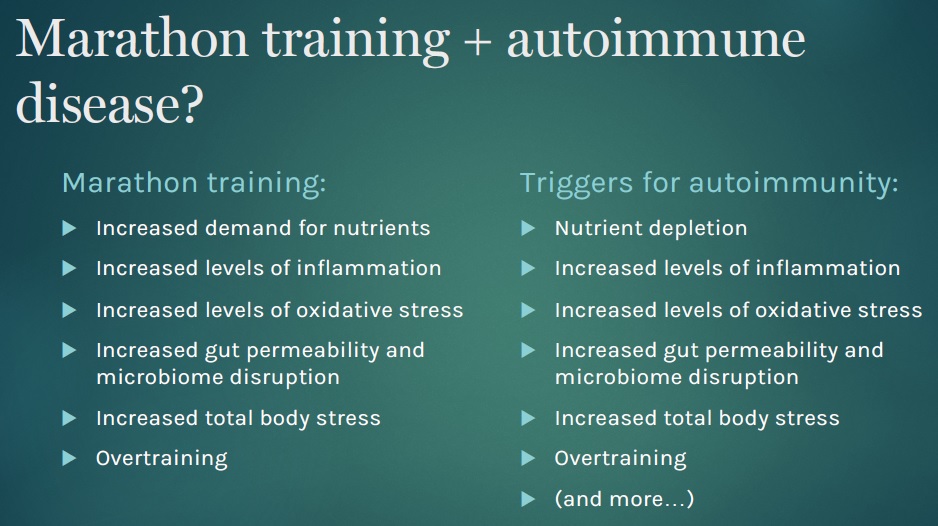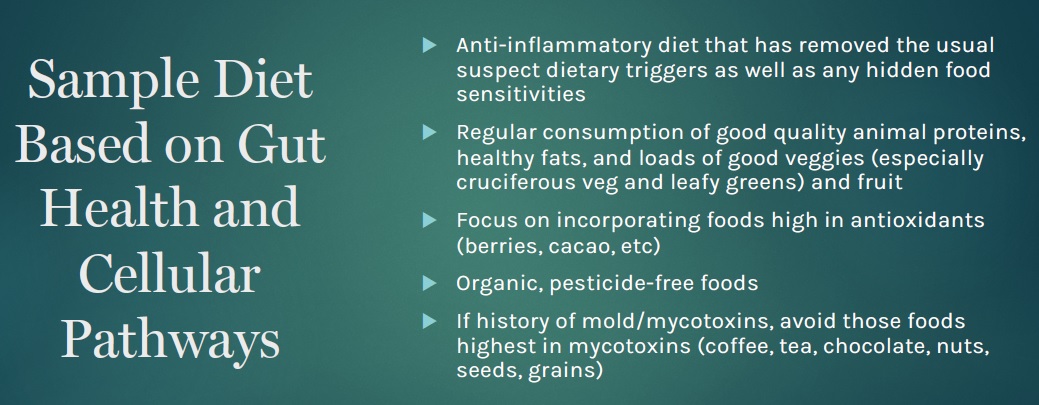Pros & Cons of Exercise
During the podcast I did with Alazra Alagic on Biohackher we discussed exercise. Alazra asked me about my recommendation for moderate exercise. In my book, this relates to exercise during pregnancy, but the following information may help you understand that while our bodies are meant to move, there are some more extreme forms of exercise that can place additional burden on us. These generally relate to high intensity and long duration or endurance sports, in particular marathons and triathlons.
Studies have identified interesting, and concerning, correlations between marathon training and autoimmune disease. Before I go any further, please note that I am not advising you to stop exercise or training. Rather, I seek to help you understand how to support your body to avoid damage.

As nutrient demands increase with endurance sports, the importance of a good diet and equally good digestive system becomes evident.
The incidence of autoimmune disease has more than tripled in the past few decades. The Australasian Society of Clinical Immunology and Allergy Association report that autoimmune diseases affect 5% of Australians and are more common than cancer or heart disease.
So what’s the link between autoimmunity and intensive, long duration exercise? Well, it all comes back to the link between our immune system and gut health.
Marathon training itself is hard on the gut
The loss of epithelial (gut lining) integrity observed during strenuous physical exercise leads to increased intestinal permeability (also called leaky gut) with bacterial translocation and inflammation. Basically the gut permeability allows bacteria and other particles to enter the area behind the gut and then into the blood stream. This alteration may negatively impact exercise performance and post-exercise recovery due to abdominal distress and impairment in the uptake of fluid, electrolytes, and nutrients. Exercise may also have a substantial impact on gut microbiota composition and structure, but the extent of microbiota’s role in exercise adaptation remains unknown.
With autoimmunity at play, digestive health becomes even more relevant. Approximately 80% of the immune system lives in and around the gut. Any digestive stressors (poor function, microbiome imbalance, overgrowth of opportunistic pathogens, compromised intestinal barrier often referred to as “leaky gut”) adds an additional burden on the immune system, laying the groundwork for an autoimmune flare.
Additional Core Considerations for Marathon Training with Autoimmunity
- Propensity to oxidative stress
- Propensity to inflammation
- Understanding the body’s detoxification capacity, including need for methylation support
- Nutrient needs – what nutrients might the body struggle to assimilate
- Additional considerations for building a training plan
One very valuable tool to help you understand your body’s unique blueprint relating to all the above is through a 3×4 DNA* test. The comprehensive analysis and report removes the guesswork and enables your naturopath to support your digestive and immune health while permitting you to continue your exercise programme.
Living on the Gold Coast, there are many avid cyclists – some hobby, some more serious. Particularly on weekends you can see larger groups cycling around the coastal or hinterland areas and stopping for refreshments before heading home. It is not unusual to see some consuming large amounts of coffee or cola drinks. A major factor affecting every single organ and cell of your body is pH – that is the acid/alkaline level of your body. Long distance cycling or running creates a significant acid burden which can take many hours to neutralise. Consuming caffeine or soft drinks increases the body’s acid load even more. During an acid state, injuries are more likely, but so too is gut damage.
How can a DNA test help?
Your DNA results will provide valuable information relating to HOW your body is able to function. This can relate to many different aspects including:
- your capacity to clear toxins and acid load
- how your body deals with or is prone to inflammation
- propensity for oxidative stress
- your ability to clear caffeine
- methylation
- your individual power – intensity -v- duration
- nutrient pathways
Everyone is unique and, I cannot stress this enough, it is essential that you be assessed by a qualified health professional trained in nutrition, physiology and functional pathology. This will enable you to receive the advice and guidance you need to achieve your physical best while protecting your body and immune system from serious damage.
Areas that your practitioner may focus on include:
- Gut healing involving the identification and removal of inflammatory foods
- Gut health maintenance
- Assess and address cellular and nutrient pathways, adjusting dietary, supplement and lifestyle strategies accordingly
- Build a training plan based on your individual genetic predisposition & where you are in your training process and any possible autoimmunity
- Check in on key markers with every training cycle, adjusting supplement protocol accordingly
A general guide to a healthy diet

In Summary
Move your body. If you choose to engage in more intensive or longer duration exercise, please consult a qualified health professional who is able to advise you on the many facets of endurance training. If you feel that you need to increase your level of activity, the old adage applies: please consult a qualified health professional. You need to fuel your body and understand its limitations while gradually increasing intensity or duration. One final piece of advice is not to forget balance – following exercise stretch well, then rest and recover.
* Our Naturopath is a registered 3×4 DNA practitioner.
Sources
Slides/images courtesy of Restorative Wellness Solutions
Ribichini, E., Scalese, G., Cesarini, A., Mocci, C., Pallotta, N., Severi, C., & Corazziari, E. S. (2023). Exercise-Induced Gastrointestinal Symptoms in Endurance Sports: A Review of Pathophysiology, Symptoms, and Nutritional Management. Dietetics, 2(3), 289-307. Available from: https://doi.org/10.3390/dietetics2030021
Barros, E.S., Nascimento,D.C., Prestes, J., Nóbrega, O.T., Córdova, C., Sousa, F., and Boullosa,
D.A. (2017) Acute and Chronic Effects of Endurance Running on Inflammatory Markers: A Systematic Review. Frontiers in Physiology, 8 (799), PMCID: PMC5650970. Available from: https://www.ncbi.nlm.nih.gov/pmc/articles/PMC5650970/
Duan, L., Rao, X., and Sigdel, K.R. (2019) Regulation of Inflammation in Autoimmune Disease. Journal of Immunology Research, 2019(7403796) PMCID: PMC6421792. Available from: https://www.ncbi.nlm.nih.gov/pmc/articles/PMC6421792/
https://www.allergy.org.au/images/stories/reports/ASCIA_AIDA_Report_2013.pdf
https://truemedicine.com.au/tips/autoimmune-disease-and-infection/
https://truemedicine.com.au/vitality/immune-health/autoimmunity/
https://truemedicine.com.au/tips/diverse-diet-for-a-healthy-gut/

